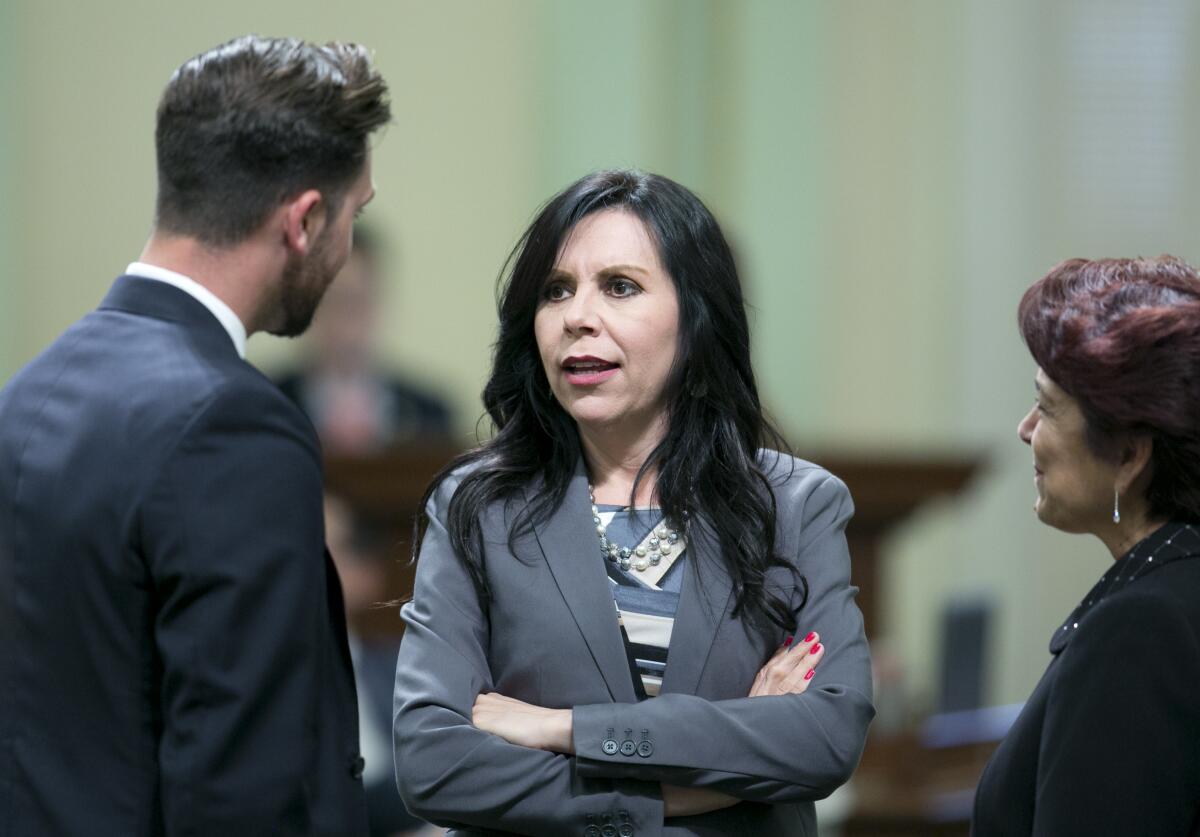How campaign funds and charitable donations help Big Oil wield power in Sacramento

- Share via
In the weeks before California lawmakers left Sacramento for their summer recess, more than a dozen environmental bills died amid heavy industry opposition in a Legislature overwhelmingly controlled by Democrats.
One would have held oil companies liable for respiratory illness in children who live near their drilling sites. Another would have asked voters to declare a “right to clean water and air” in California. Others would have divested public employee retirement funds from fossil fuels, or stopped state agencies from purchasing plastic bottles.
Legislators say there were many factors in these bills’ demise — the state’s $45-billion budget deficit, for instance, and several lawmakers being out with COVID-19 just before a key deadline.
But there was another common thread: Industries that opposed these bills have a record of financially supporting the Legislature’s moderate Democrats through a mix of campaign contributions and donations to the politicians’ favored charities.
A proposal to amend California’s Constitution to enshrine environmental rights for all citizens has been delayed for at least another year.
In the last two election cycles, Chevron spent nearly $10 million on California races, according to data from the secretary of State. Valero spent another $3.9 million, the data show, and Marathon Petroleum spent $3.3 million. A quarter of their donations to legislative candidates went to Democrats and millions more went to committees that support them.
The companies also routinely make charitable donations at the behest of politicians, which can serve as another way to curry favor. Between 2021 and 2023, Chevron, Marathon Petroleum, Calpine, Phillips 66 and the Western States Petroleum Assn. combined gave more than $800,000 to nonprofit groups at the request of state lawmakers, according to data from California’s Fair Political Practices Commission. More than half of this money came from Chevron, which gave more than $440,000.
“What big money in politics does is block legislation. It maintains the status quo. And I’m very willing to say that is not good for California,” said Assemblymember Steve Bennett (D–Ventura), whose bill to limit plastic purchases was among those that died quietly in May when it didn’t come up for a vote by a critical midyear deadline.
In June, Assemblymember Isaac Bryan (D–Los Angeles) shelved a constitutional amendment to establish a right to a clean environment for Californians, vowing to reintroduce an improved version next year. The petroleum association had lobbied against it and the California Chamber of Commerce, whose board includes executives from Chevron and other energy companies, had branded it a “Job Killer,” a label that often impedes support from business-friendly legislators.
Also in June, Sen. Lena Gonzalez (D–Long Beach) announced she wouldn’t advance her bill to divest public employee retirement funds from the fossil fuel industry. SB 252 faced heavy opposition from the oil industry, and multiple moderate Democrats did not support it on the Senate floor. Gonzalez said in a statement that her decision to hold the bill was because of committee amendments that would have weakened it.
In a Legislature generally known as one of the most progressive in the nation, where Democrats hold a supermajority and fighting climate change has been a priority, moderate Democrats can serve as a key swing vote that determines how far left California will go. While environmentalists see them as beholden to the corporations that support their campaigns, business leaders see moderate Democrats as a balancing force in a Capitol where one party has all the control.
“That middle group is really important to policy,” said Kevin Slagle, a vice president of the Western States Petroleum Assn., which lobbies for oil companies at the Capitol.
“They play an important role … in keeping policy going too far one way or the other.”

Slagle said the petroleum association opposes many environmental bills out of concern that they would raise energy costs. Though California has been aggressive in transitioning to clean energy, it remains one of the nation’s top oil-producing states.
The industry has found an ally in Assemblymember Blanca Rubio (D-Baldwin Park), the leader of the moderate Democrats, a loose bloc of legislators who sometimes side with Republicans to tank progressive ambitions.
Oil companies and trade associations have donated more than $200,000 to Rubio over the last eight years, according to state campaign finance data. She has accepted more oil money in that time than any other current legislator, and leads runner-up Tim Grayson (D-Concord) by about $40,000.
“She’s very smart, she’s very capable. She’s got a really good understanding of environmental issues and how they affect real people,” Slagle said of Rubio. “Not just understanding the aspirational goals of a lot of this policy, but understanding how these policies actually impact people’s lives.”
Environmental advocates say Rubio votes in the interest of her Big Oil donors. Organizations that lobby for climate action score legislators on their support for climate-friendly bills. California Environmental Voters gave Rubio a 33% for the 2023 legislative session — down from 83% in 2017, her first year in the Legislature.
“The average score of a Democrat who accepted oil money is 66%,” said Melissa Romero, a legislative advocate for California Environmental Voters. “The average score of a Democrat who did not take oil money is 96%. An A. So you can see really clearly how oil money influences their environmental voting record.”
“For Blanca Rubio, one of the Democrats who receives the most money from oil, that correlation couldn’t be more clear,” Romero added.
Rubio did not respond to questions about her voting record.
An initiative funded by fossil fuel interests that sought to reverse California’s rules about how close oil wells could operate near homes and schools has been pulled from the November ballot.
The bills that Rubio didn’t support propose a variety of environmental protections, and many target the oil industry’s operations in California.
In 2022, she withheld her vote on SB 1137, which passed and prohibits new oil drilling near schools, playgrounds and neighborhoods.
The same year, she withheld her vote on SB 260, which would have required major companies to disclose information about their carbon footprint. The bill failed, but was reintroduced as SB 253 and passed last year — she didn’t vote for it then, either.
She also didn’t vote for AB 1167, which requires major oil companies to clean up wells that are nearly tapped, or on AB 631, which increases penalties for violation of state oil and gas regulations. Both passed.
Rubio’s relationship with Big Oil also helps her raise money for her annual Thanksgiving charity event, Operation Gobble. Last year, she raised enough to provide more than 1,000 turkeys to families in the San Gabriel Valley area she represents. Chevron and Valero each gave $5,000. Rubio reported raising $124,000 for the event.
Asked about the donations at the turkey giveaway last year in West Covina, Rubio cited the benefit to her constituents.
“I never miss an opportunity to ask,” she said. “And if I’m asking, it’s because my community needs it.”
People in a line of cars more than a mile long waited for hours to get free turkeys in bags branded with Rubio’s name. The turkey giveaway allows Rubio, who has represented the district since 2016, to help her community, but it also enhances her image.
Earlier this year, she faced a challenger from the left in the primary election: West Covina Mayor Brian Tabatabai. He said Rubio does not do enough to address climate change, the housing crisis and the plight of public schools.
The California Democratic Party endorsed Rubio in the race, though, and she trounced Tabatabai, winning the election with more than twice as many votes as her Democratic opponent. He said the Rubio name is well known in his district and called her turkey giveaway a “PR event.”
In conversation, Blanca and Susan Rubio suggest they’re near-identical. But for their shared experiences, they bring differing styles to their jobs in Sacramento.
“I don’t put much into that event being about the needs of the community,” Tabatabai said. “It’s a way to brand her name, to get her some publicity.”
Rubio said seeking charitable donations from the companies that lobby her is a way to help her constituents. She also acknowledges that donors may have other motivations. Chevron, like other companies that make charitable donations at the request of state lawmakers, reports its turkey donation on its lobbying disclosure as an official “payment to influence.”
“Of course, they want to be on my good side,” Rubio said. “It’s all political. If we understand that, they know where they’re at, I know where I am. That’s why I’m like, ‘Hey, give some money for my charity organizations that help me do all this.’ It has to be that way, I mean, it’s all relationships.”
Fitzgerald and Harrison-Caldwell are freelance journalists. They began reporting this story while at the Investigative Reporting Program at Berkeley Journalism.
More to Read
Sign up for Essential California
The most important California stories and recommendations in your inbox every morning.
You may occasionally receive promotional content from the Los Angeles Times.













